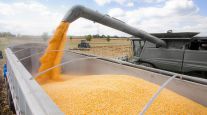Agriculture Dept. Faces Broad Opposition over Plan to Triple Border-Inspection Fees
This story appears in the Aug. 4 print edition of Transport Topics.
The U.S. Department of Agriculture heard strong opposition from transportation groups, members of Congress and the Canadian government in response to a plan to triple border-crossing inspection fees and to create a new fumigation fee.
They said the fees would hurt the economy, kill jobs, slow international trade and raise the price of their products for consumers.
In April, USDA’s Animal and Plant Health Inspection Service proposed raising the cost of a single international border truck crossing to $8 from $5.25 and the cost of a decal transponder to $320 annually from $105.
It also would create a new $375 fumigation inspection fee per truck. The proposal also would increase fees for commercial cargo aircraft and commercial maritime vessels but would decrease fees for railcars and air passengers.
American Trucking Associations said that, with nearly 11 million annual truck crossings into the United States from Canada and Mexico, the fees would have a “substantial direct financial impact” on operations.
“First, the fees increase the regulatory burden for the transportation industry, and eventually the international trade community that depends on our services,” ATA said. “Second, the proposed new fees, especially the 205% increase for transponders, have the potential for significantly worsening congestion and its associated undesirable adverse impact at international land border ports of entry.”
Gilles Gauthier, economic minister of the Canadian Embassy in the United States, said the fees would disproportionately affect U.S.-Canada trade because nearly 60% is shipped by truck.
“Under the proposed fee in-creases, Canadian enterprises would be subject to an average 23% increase in APHIS fee payments to the United States,” Gauthier wrote.
Likewise, the Canadian Trucking Alliance and Canadian International Freight Forwarders Association said the fees would be “excessive and imposed on the wrong party, the carriers.” They said the fee should be paid by the importer of the goods.
CTA said it believes the proposed fee increases violate the North American Free Trade Agreement and the General Agreement on Tariffs and Trade. Fee increases should not apply to trucks hauling low-risk commodities.
The American Association of Port Authorities said it understands that “it has been nearly a decade since APHIS fees were last raised, but the proposed increases are inordinately high, especially in this time of economic recovery.”
Likewise, the North Atlantic Ports Association, whose member ports include Boston, New York, and Norfolk, Va., and other seaports in between, opposed the plan.
“Our position is even more vulnerable as we compete with ports in Canada,” the group said. “When steamship lines seek out ports of call, they calculate all involved costs. This increase has the potential of putting the ports of the North Atlantic Range out of the market.”
The agency also heard from the Niagara Falls Bridge Commission, which operates three bridges connecting Ontario and New York.
“Trucks with transponders trapped behind an increasing number of trucks paying cash will increase wait times and exacerbate an already unacceptable situation,” the commission wrote. “The application of the proposed fee to all commercial carriers including empties does not appear to be logical or justifiable.”
Members of the U.S. congressional delegation from Florida said the fees would damage the importers of fresh produce through the Port of Miami.
“New fees will especially impact small and medium firms involved in the trade of perishable goods and could have a chilling effect on future cargo imports, reducing port revenues and jobs throughout Florida,” the group of seven said.
However, three U.S. senators — Democrats Diane Feinstein of California and Thomas Carper of Delaware, and Republican Tom Coburn of Oklahoma — wrote a letter in support of the proposal.
“A 2012 Government Accountability Office study found that there was a $325 million gap in program costs and user fee revenue in fiscal year 2011,” the senators wrote. “Given increasing agricultural trade flows and the current fiscal environment, it is more important than ever to realign user fees to match program costs.”
APHIS did not respond to a request from Transport Topics for comment. The agency now will consider the comments before deciding whether to proceed with a final rule, which could be issued as soon as December.




